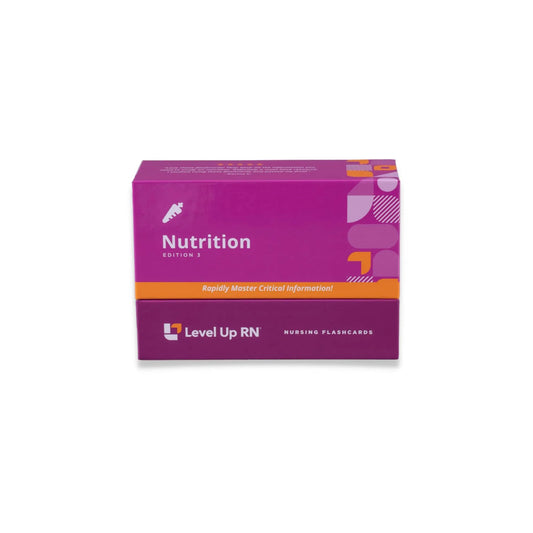Hi, I'm Cathy with Level Up RN. In this video, I will be continuing my coverage of nutrition for gastrointestinal disorders. Specifically, I'll be talking about nutrition for peptic ulcer disease and gastritis. At the end of the video, I'm going to give you guys a quiz to test your understanding of some of the key facts I'll be presenting, so definitely stay tuned for that. And if you have our Level Up RN Nutrition Flashcards, go ahead and pull out your flashcard on peptic ulcer disease and gastritis so you can follow along with me.
First, let's talk about peptic ulcer disease, which is where we have an erosion in the mucosa in the stomach, duodenum, or esophagus. The most common cause of peptic ulcer disease is an H. pylori infection. Another common cause is chronic use of nonsteroidal anti-inflammatory drugs, or NSAIDs. Signs and symptoms of peptic ulcer disease include pain, nausea, and vomiting, bloating, and bleeding. In terms of nutritional and lifestyle guidance for peptic ulcer disease, patients are advised to quit smoking, avoid the use of NSAIDs, and avoid consumption of alcohol and caffeine.
Next, let's talk about gastritis, which is inflammation of the gastric mucosa, which is the stomach lining. Just like with peptic ulcer disease, gastritis can be caused by an H. pylori infection, as shown here, as well as long-term NSAID use. Other causes include smoking, stress, and heavy alcohol consumption. Signs and symptoms of gastritis include abdominal pain, heartburn, bloating, nausea, and vomiting, and a lack of appetite. In terms of nutrition and lifestyle guidance for gastritis, keeping a food symptom journal can help identify foods that worsen symptoms. For some people, reducing intake of fatty, spicy, or acidic foods can help ease symptoms. Individuals with gastritis are also advised to avoid alcohol and nicotine and reduce stress as well.
All right. It's quiz time. Are you guys ready?
Question number 1. The most common cause of peptic ulcer disease is an infection with blank.
The answer is H. pylori.
Question number 2. Long-term use of which class of analgesics can result in peptic ulcer disease or gastritis?
The answer is NSAIDs.
Question number 3. Patients with peptic ulcer disease or gastritis are advised to avoid alcohol and smoking. True or false?
The answer is true.
All right. That's it for this video. I hope it was helpful. Thank you so much for watching, and good luck with studying.


